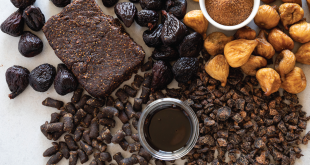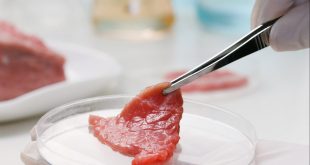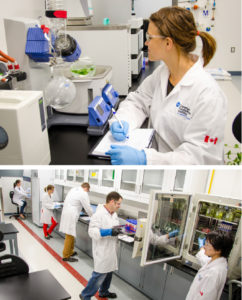
Canada’s food science students gain a holistic knowledge of the food industry
By Hermione Wilson
As the leaves start to turn, students all over the country settled in for a brand new school year. We took a peek into the classrooms of food science programs to see how Canadian colleges and universities are preparing students for work in the food industry.
In the Classroom: University of Manitoba (Manitoba)
In Manitoba, the food industry is very diversified, particularly in the area of commodity processing. The province has some of the largest potato processing facilities in Canada, with McCain Foods and J.R. Simplot Company plants in Portage la Prairie. Manitoba has also become something of a bacon capital since Maple Leaf established a processing facility in Winnipeg.
That’s the environment the University of Manitoba’s Food Science program is preparing its students to be a part of. “Our students are highly employable with the skills that they’re acquiring in our program,” says Department Head James House. “Our students will find their places in product development arenas.”
The program has a focus on grain processing and integration with the grain sector in Manitoba, but students are also well integrated with other aspects of the agri-food system including nutrition.
“We’re looking at creating stronger linkages between food science and human nutritional sciences, because that’s really key that our students understand the basic facts that are influencing decisions being made by the consumer; health consciousness is one of the biggest drivers,” House says.
The University of Manitoba’s Food Science program has a good relationship with the province’s Food Development Centre, a commercialization and innovation centre for the food sector, as well as an incubator for new companies. That means food science students who do their co-ops there are well placed to be employed by the Food Development Centre or start-up companies that begin there.
After Graduation: Cara Thorleifson, Maple Leaf Foods
University of Manitoba alumna Cara Thorleifson develops new products for Maple Leaf Foods. “I do all of the scientific work in the background in order to hit all of our macro and micro targets for the nutrition and flavour profile that we’re looking for,” Thorleifson says. “I [also] do a lot of work with the machinery and the packaging equipment.”
Thorleifson, who completed a BSc in Food Science at the University of Manitoba, points to a number of elements of the program which prepared her for her current profession. There were dynamic professors doing interesting research, she says, and practical courses like mechanical engineering. One course in product development, for instance, required students to develop a product from the ground up. Students had to provide specifications for packaging and all of the materials necessary to launch the product. The importance of timing was particularly emphasized, she says.
“The program’s sense of urgency and development time… was very eye opening and has made an impact on the way I handle all of my [product] launches and… all of my development,” Thorleifson says. “I have to pay attention to how quickly I get things done because it is 100 per cent impactful on the success of the product.”
Thorliefson has long had an interest in food. She started cooking at the age of 16 and completed a culinary arts diploma before deciding to go back to school for a degree in food science. “I discovered that I found the science of food far more interesting than I did just making it for other people,” she says.

In the Classroom: McGill University (Quebec)
McGill’s food science program grew out of two pre-existing programs: Nutrition and Home Economics, and Agricultural Chemistry and Physics. In 1986, “they decided to mix them together and generate a new department called Food Science and Agricultural Chemistry,” says Departmental Chair Varoujan Yaylayan. The program is accredited by the Chicago-based Institute of Food Technologists (IFT) and The Canadian Institute of Food Science and Technology (CIFST) recognizes the McGill program and its students as eligible for CIFST scholarships.
Within the Food Science and Agricultural Chemistry department, McGill offers both graduate and undergraduate programs. There is a Bachelor of Science (BSc) in Food Science and a BSc in Food Chemistry, as well as a concurrent four-year Food Science and Nutritional Science program which allows students to obtain two separate BSc degrees at once. The BSc in Food Chemistry is recognized by the Ordre des chimistes du Québec, which means students of the program are eligible for membership in the order and are allowed to act as official chemists and sign chemical analysis reports, Yaylayan says.
There is a master’s program and a doctoral program that emphasize the fundamental research applications of food science. “We have different professors working in different types of research involving processing, development of ingredients, food chemistry, analysis of flavours, aromas… microbiology, food safety, food genomics,” Yaylayan says. “Because we do research, we have a good connection with the food industry. We have different contracts with different food companies to help them in their research, to help them develop their products.”
Apart from interacting with the food industry through research projects, McGill students also enjoy a vibrant internship program. “We have 15 to 25 students going to internship training in almost all the food companies that are available in the Montreal area,” Yaylayan says. The food science students also have the opportunity to compete in IFT’s annual New Product Development Competition in Chicago, which McGill students won for the second consecutive year in 2016. The winning project was a vegetarian burger that used plant-based protein and natural food colouring.
“This is one of the hands-on experiences that students will gain, to actually come up with a project idea of a new food,” Yaylayan says. Students also get experience on the post product development stage through McGill’s entrepreneurship course, which teaches them to write a business plan and market a product. Quite a few students go into private business, Yaylayan.
After graduation: Ziad Khoury and Diana Valtierra Rodriguez, N3 Nutrition
Ziad Khoury and Diana Valtierra Rodriguez are the husband and wife team behind N3 Nutrition, a food manufacturing company that specializes in nutritional, gluten-free and allergen-reduced food products. Both Khoury and Rodriguez are former students of McGill University. Khoury completed a BSc and MSc in Food Science in 2000 and 2003 respectively, later did his master’s thesis in protein chemistry. Rodriguez completed her PhD in Food Science and a doctoral thesis project on protein chemistry in 2015.
“We both have a specific specialty which is structure functionality of protein and understanding essentially how changes in the protein structure of specific sources of protein can affect the texture of the finished product,” Khoury says. They have applied that technical know-how to fresh baked goods in their business, especially with their brand Baked2Go.
Baked2Go was born out of their desire to provide clients with baked goods that had the look and taste of fresh bakery offerings but could be delivered remotely.
“The interest here was to give added value to fresh-baked goods… besides [adding] the traditional bit of flax seed and calling it healthy,” Khoury says. “Beyond the nutritional plus, there’s a whole allergen control aspect which is core to our business. Our facilities are gluten-free, sesame-free, peanut-free and tree nuts-free. That also gives us access to clientele that was otherwise [unable] to go to a traditional bakery to have safe products to consume for themselves and their families.”
After three years in business, N3 Nutrition has built up a loyal customer base, Khoury says. The company makes a special effort to connect with its customers via social media and through direct contact, and tweaks product lines based on feedback. Deliveries are to customers both in Canada and the U.S.
Khoury says he was attracted to McGill’s food science program because of the strong base courses in food science and chemistry. After graduation, he went to work in the nutraceuticals industry and had the opportunity to hire other McGill graduates while he was there. He noticed that they tended to have strong analytical skills and were comfortable managing complex projects with a lot of unknowns.
“McGill grads fresh out of university have a pretty good advantage vis-a-vis other food science graduates in terms of managing big amounts of information and transferring that information to their colleagues through presentations, meetings, etc.,” Khoury says. “This is very key because we’re often swamped with information and it’s a key skill to be able to summarize this in a rather quick way and transfer this information to your colleagues or to your teammates.”
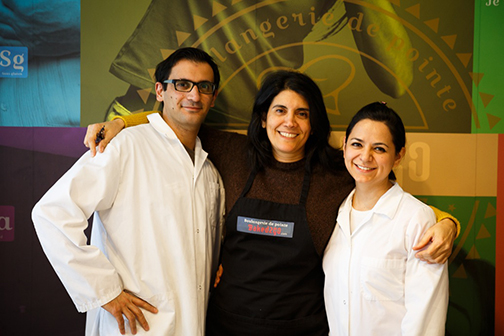
In the Classroom: British Columbia Institute of Technology (British Columbia)
British Columbia Institute of Technology (BCIT)’s Food Safety and Processing umbrella program caters to food industry professionals who want to upgrade their skills. The students are a diverse cross section of the industry from those who work on the production floor to chemists and scientists.
The BCIT Food Safety and Processing program splits into three separate sections: Food Safety, Food Technology, and Food Technology and Operations Management. The school offers a part-time Food Safety Associate Certificate, a two-year Food Technology diploma program, and a Food Technology and Operations Management program that builds on the two-year Food Technology diploma and leads to a bachelor’s degree.
The BCIT Food Technology program is very hands-on, Friesen says. “The students are doing lots of labs compared to a traditional university program, so with every lecture course there’s a lab course that goes with it,” says Erin Friesen, Program Head for Food Technology.
Students in both the Food Technology and Food Technology and Operations Management programs also do a directed studies project where they work with the food industry. “If industry has, let’s say, a shelf life issue with one of their products or they want a new product developed, they submit a proposal to us in about October and then the students get to choose what project they want to tackle,” Friesen says. “They’re usually either working on them individually or in pairs and then they work on these projects until about May and then they present the results back to industry on what they found.”
Friesen the program is constantly being re-evaluated to make sure the right courses and training are offered. In addition, BCIT’s program advisory board meets twice a year. “We have about seven people from industry who are on our board and they meet, and we make sure our curriculum is relevant to what industry wants,” she says. One of the reviews suggested the addition of a product development course, which was added three years ago.
After Graduation: Andrew Chen and Ariela Badenas, Tempea Natural Foods
Tempea Natural Foods is a success story Friesen is particularly proud of. The two former BCIT students who developed the Tempea product (soy tempeh that’s sold fresh and unpasteurized), Andrew Chen and Ariela Badenas, first showcased it at Pulse Canada’s 2015 Mission: ImPULSEible Student Food Product Development Competition. They took first place and soon after they launched their company which, as far as Friesen knows, is the first time students have turned their winning project into a business.
“What really pushed us to pursue this was the great feedback that we got from people,” Badenas says. She and Chen, both graduates of BCIT’s Food Technology diploma program, incorporated their business in December 2015 and started production in late June 2016. They have been sharing a production facility with other food startups and Badenas says she can see how BCIT uniquely prepared them for the challenge of starting their own business.
“It’s really helpful that BCIT gives us all the technical knowledge and information that we need, especially the skills that you need on the job,” Badenas says. “I think we really stand out from the other [startups] because we have that solid foundation on food science… It really did help us get things going a lot faster.”
The goal now is to develop a product as recognizable to consumers as tofu is now, Chen says. “We really want Tempea to be a product that stands by itself,” he says. “In the future we hope that it will be comparable to tofu in terms of an alternative protein source.” It also means that Tempea is doing its part to contribute to a more sustainable food industry by reducing the consumption of animal proteins, Chen says.
“We know the trends for this year: vegan foods and plant-based protein,” Badenas says. “I think we feel that everything is starting to fall into place.”
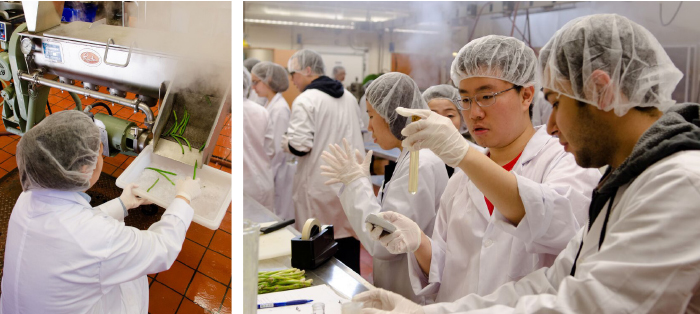
In the Classroom: Niagara College (Ontario)
Niagara College’s Culinary Innovation and Food Technology three-year advanced diploma emphasizes the practical side of food industry training, says Amy Proulx, Program Coordinator for Culinary Innovation and Food Sciences.
“We really need people who are ready to go into industry with hands-on, Monday-morning-ready skills, whether they’re designing and maintaining a HACCP program or taking quality assurance samples or designing a new food product,” Proulx says. “We need those people with the hands-on skills and not just the idea of how to do, but the real practical knowledge of how to do it.”
Every year Proulx says she hires three or four co-op students from the program to work for the college’s Canadian Food and Wine Institute (CFWI), an innovation centre that is funded by NSERC and provides technical services to the Canadian food industry. The rest of the cohort goes out to work with the industry. Proulx says students go as far as Vancouver and New Brunswick, though the majority end up in the Toronto area.
Like many food science programs, the Culinary Innovation and Food Technology program offers the core competency course in food chemistry, food microbiology, food process engineering, HACCP (Hazard analysis and critical control points) programming, and GSSI (Global Seafood Sustainability Initiative).
“Those are all part of our program, but we also have a large emphasis on the product design aspect of our work,” Proulx says. “In Canada we know that price is king when it comes to customer selection, but taste and desirability are what drive repeat sales and we need people who have the creative skills to be able to pull off ‘delicious.’”
Niagara College has one of the only food science programs in Canada that also offers culinary skills training, Proulx says. Students have the opportunity to complete what is in essence a one-year chef skills diploma on top of their food science programming. Proulx says it is one of the most intensive programs at the Canadian Food and Wine Institute and one of the hardest at the college. “Students on average will be in the classroom between 24 to 26 hours a week, which is heavy when compared to many university programs,” she says.
Being as this is wine country, the program also offers specific courses in wine production, which involve students teaming up with the on-campus commercial winery, as well as a two-year Brewmaster and Brewery Operations Management program. The college will be adding an Artisanal Distillations program and a commercial distillery in 2017. There is also an on-campus fully industrial, scalable bake shop where food science students can come in and write a HACCP program for, take quality assurance samples, or design a new product for an industry client. All these options are available to students because of Niagara’s unique commercial spaces, Proulx says.
After Graduation: Rebecca Griffin and Genevieve Bisset
Rebecca Griffin’s story reads as a case study of just how ready Niagara College Culinary Innovation and Food Technology students are to jump into the food industry. When Griffin was only a sophomore in the program, she was engaged to develop an alcohol-free beverage for Mothers Against Drunk Driving (MADD). The organization has a licensed beverage brand and had a beer-type product that wasn’t selling very well. MADD engaged CFWI in2013 to come up with something better and Griffin was one of the first cohort of students brought in to work on industry projects.
“[Becky] identified a brand new processing methodology that was scalable to any craft brewer… and we developed a brand new 0.0 per cent non-alcoholic beer,” Proulx says. The beer has since won the Retail Council of Canada’s Best Beverage in 2015, and won the US Open Beer Championship two years in a row as the best non-alcoholic beer offering.
“It takes confidence on our part as a college to put young people like [Griffin] into positions of trust, but at the same time, those young people often come without the biases of how things have always been done and are able to find innovative and creative solutions to these problems and come with ideas that even experienced professionals like myself would not think of,” Proulx says.
Then, when former Dragon’s Den personality and restaurateur, Vikram Vij, approached CFWI about developing a food processing plant, food science student Genevieve Bisset was part a group of students engaged in the project. Vij wanted to provide people with restaurant-quality food in their own homes that they could pick up at their local grocery store and Bisset was the one who developed all the documentation for his HACCP program and federal registration. “He was so pleased with the results that he hired her to join his team,” Proulx says. “She’s his quality assurance manager now and she only graduated a year ago.”
Read an exclusive interview with George Brown College’s Winnie Chiu, Director of George Brown College’s Food Innovation and Research Studio (FIRSt).
 Canadian Food Business
Canadian Food Business
